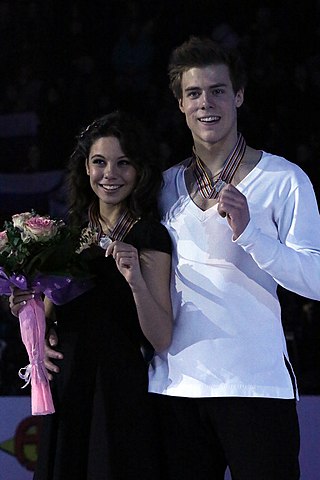
The World Figure Skating Championships, commonly referred to as "Worlds", are an annual figure skating competition sanctioned by the International Skating Union. Medals are awarded in men's singles, women's singles, pair skating, and ice dance. Generally held in March, the World Championships are considered to be the most prestigious of the ISU Figure Skating Championships. With the exception of the Olympic title, a world title is considered to be the highest competitive achievement in figure skating.

The European Figure Skating Championships are an annual figure skating competition in which figure skaters compete for the title of European champion. Medals are awarded in men's singles, women's singles, pair skating, and ice dance. The event is sanctioned by the International Skating Union (ISU) and is the sport's oldest competition. The first European Championships were held in 1891 in Hamburg, Germany, and featured one segment, compulsory figures, with seven competitors. They have been held continuously since 1891, with only five interruptions, and have been sanctioned by the ISU since 1893. Women were allowed to compete for the first time in 1930, which is also the first time pair skating was added to the competition. Ice dance was added in 1954. Only eligible skaters from ISU member countries in Europe are allowed to compete.
The ISU Junior Grand Prix of Figure Skating is a series of international junior-level competitions organized by the International Skating Union. Medals are awarded in the disciplines of men's singles, ladies' singles, pair skating, and ice dancing. The series was inaugurated in 1997 to complement the senior-level ISU Grand Prix of Figure Skating. Skaters earn qualifying points at each Junior Grand Prix event and the six highest-ranking qualifiers meet at the ISU Junior Grand Prix Final, which is held concurrently with the Grand Prix of Figure Skating Final.

Figure skating at the 2010 Winter Olympics was held at the Pacific Coliseum in Vancouver, British Columbia, Canada. The events took place between 14 and 27 February 2010.
The 2011 World Junior Figure Skating Championships was an international figure skating competition during the 2010–11 season. Commonly called "World Juniors" and "Junior Worlds", the event crowned the World Junior Champions in the disciplines of men's singles, ladies' singles, pair skating, and ice dancing.
The 2010–11 ISU Junior Grand Prix was the 14th season of the ISU Junior Grand Prix, a series of international junior level competitions organized by the International Skating Union. It was the junior-level complement to the 2010–11 ISU Grand Prix of Figure Skating, which was for senior-level skaters. Skaters competed in the disciplines of men's singles, ladies' singles, pair skating, and ice dance.

The 2013 European Figure Skating Championships was a senior international figure skating competition in the 2012–13 season. The competition was held from 23 to 27 January 2013 at the Dom Sportova in Zagreb, Croatia. Medals were awarded in the disciplines of men's singles, ladies' singles, pair skating, and ice dancing.

The 2013 World Junior Figure Skating Championships was an international figure skating competition in the 2012–13 season. Commonly called "World Juniors" and "Junior Worlds", the event determined the World Junior champions in the disciplines of men's singles, ladies' singles, pair skating, and ice dancing.
The 2014 World Junior Figure Skating Championships was an international figure skating competition in the 2013–14 season. Commonly called "World Juniors" and "Junior Worlds", the event determined the World Junior champions in the disciplines of men's singles, ladies' singles, pair skating, and ice dancing. It was held in Sofia, Bulgaria.
The 2015 World Junior Figure Skating Championships was an international figure skating competition in the 2014–15 season. The event was held on 2–8 March 2015 at the newly constructed Tondiraba Ice Hall in Tallinn, Estonia. It determined the World Junior champions in the disciplines of men's singles, ladies' singles, pair skating, and ice dance.
The 2015–16 ISU Junior Grand Prix was the 19th season of a series of junior international competitions organized by the International Skating Union. It was the junior-level complement to the 2015–16 ISU Grand Prix of Figure Skating. Medals were awarded in the disciplines of men's singles, ladies' singles, pair skating, and ice dance. At each event, skaters also earned points toward qualifying for the final. The top six skaters or teams from each discipline met at the 2015–16 Junior Grand Prix Final, held together with the senior final.

The 2016 World Junior Figure Skating Championships were held from 14–20 March 2016 in Debrecen, Hungary. Commonly called "World Juniors" and "Junior Worlds", the event determined the World Junior champions in the disciplines of men's singles, ladies' singles, pair skating, and ice dancing.

Figure skating at the 2016 Winter Youth Olympics took place at the Hamar Olympic Amphitheatre in Hamar, Norway from 12 to 21 February 2016.

The 2017 World Junior Figure Skating Championships were held March 15–19, 2017 in Taipei, Taiwan. Commonly called "World Juniors" and "Junior Worlds", the event determined the World Junior champions in the disciplines of men's singles, ladies' singles, pair skating, and ice dancing.
The 2017–18 ISU Junior Grand Prix was a series of junior international competitions organized by the International Skating Union that were held from August 2017 through December 2017. It was the junior-level complement to the 2017–18 ISU Grand Prix of Figure Skating. Medals were awarded in men's singles, women's singles, pair skating, and ice dance. Skaters earned points based on their placement at each event and the top six in each discipline qualified to compete at the 2017–18 Junior Grand Prix Final in Nagoya, Japan.
The following is about the qualification rules and allocation of spots for the figure skating events at the 2018 Winter Olympics.
The 2019 World Junior Figure Skating Championships were held in Zagreb, Croatia from 4 to 10 March 2019.
The 2019–20 ISU Junior Grand Prix was a series of junior international competitions organized by the International Skating Union that were held from August 2019 through December 2019. It was the junior-level complement to the 2019–20 ISU Grand Prix of Figure Skating. Medals were awarded in men's singles, women's singles, pair skating, and ice dance. Skaters earned points based on their placement at each event and the top six in each discipline qualified to compete at the 2019–20 Junior Grand Prix Final in Turin, Italy.
The 2020 World Junior Figure Skating Championships were held in Tallinn, Estonia on March 2–8, 2020. Figure skaters competed for the title of junior world champion in men's singles, ladies' singles, pairs, and ice dance. The competition determined the entry quotas for each federation during the 2020–21 ISU Junior Grand Prix series and at the 2021 World Junior Championships.
The 2023 World Junior Figure Skating Championships was held in Calgary, Canada, from February 27 to March 5, 2023. Medals were awarded in men's singles, women's singles, pairs, and ice dance. The competition determined the entry quotas for each federation at the 2024 World Junior Championships.








